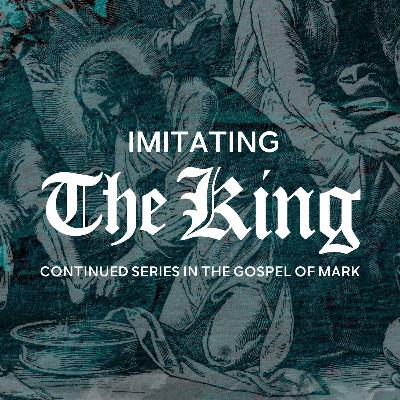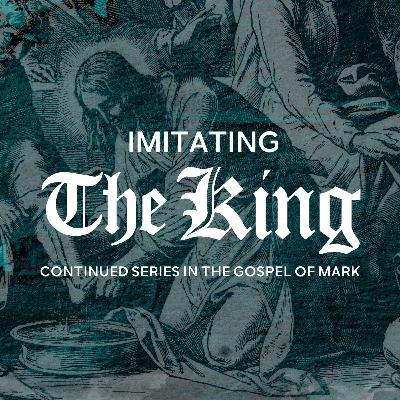Discover Sunday Sermons | Evergreen Church
Sunday Sermons | Evergreen Church

281 Episodes
Reverse
As the leaves of the fig tree here concealed the fact there was no fruit to enjoy, so the magnificence of the Temple conceals the fact that Israel has not produced the fruit of righteousness expected by God. Both incidents are prophetic warnings of the wrath to fall upon Israel for honoring God with their lips when their heart was far from Him. The passion of Jesus brings both salvation and judgment.
Mark’s Gospel has been described as a passion narrative with a lengthy introduction. Seen traditionally, Mark places the arrival into Jerusalem on Sunday, cursing of the fig tree and clearing the Temple on Monday, final conspiracy and anointing on Wednesday, Passover and arrest on Thursday evening, trial and crucifixion on Friday, and resurrection on the following Sunday. Here the Messiah enters His capital city in clear fulfillment of OT prophecy.
Christmas was never meant to be a stand-alone event in history. The Nativity bookends God’s miracle of incarnation with the events of Easter. The historical parallels bring the story full circle and reveal a divine plan of redemption that was never in doubt. Christmas pushes us toward Easter; and Easter draws our minds back to Christmas. This is the story of Salvation!
Since before the intrusion of sin into the world, God’s desire has been to be in personal relationship with men and women created in His image. After sin occurs, His impulse is still to be with us, even when that requires a cosmic sacrifice on His part to secure a place for us in His presence. The entire story arc of the Bible is the unfolding of this advent impulse, His intention to come to us in a way we can understand and to secure fellowship for eternity.
Jesus continues to unveil coming events with ever increasing detail. While these teachings are clearly turning the minds of the disciples toward eternity, their unfortunate response is still concerned with status and position. The final reminder they need before arriving in Jerusalem is found in the enthusiasm of new faith…so also for Evergreen!
Contemporary American Christianity has an obsession with wealth and prosperity. This preoccupation is the result of misunderstanding precisely what discipleship requires. The breathtaking expectation for Jesus-followers confronts dramatically the only man mentioned in the Gospels who went away sad from the presence of Jesus.
Family life in every generation is a special target of the enemies of God. Marriage is intended as a model for the gospel and children are fresh reminders of the image of God impressed on every living soul. Accordingly, Jesus takes marriage and children seriously, even personally. Shouldn’t the Church be devoted to the same priorities as our Lord?
As Jesus continues instruction on discipleship in light of His upcoming rejection and death, He now confronts the selfish ambition and envy found within His own small group of disciples. Mark collects a variety of related sayings in this chapter in order to summarize the critical importance of adopting the standards of Jesus for the life of faith.
As delegation of ministry to the disciples continues, a colossal failure is discovered by the group returning from the transfiguration. Jesus responds in a way that reveals the dethroning of Satan is always a reversal of death and an affirmation of life. There is a practical lesson here—as wonderful and important as mountaintop experiences can be, a disciple’s primary occupation is in the valley of service.
Mark wants us to understand that Jesus is more than what He appears to be, that He is, in fact, the Son of God unquestionably. He had to suffer, but suffering was not His ultimate destiny. His destiny was to be glorified. The mystery here is the balance and chronology between the two realities—Suffering Servant and Glorified King.
The call to follow Jesus is not a blind leap of faith into the darkness. It is, rather, an act of will based on rational calculations related to life and eternity. Discipleship involves suffering. If the Messiah must suffer, so must His followers. But weighing the options, this suffering is a worthwhile trade for the guarantee of what’s to come.
After two years of following Jesus, the disciples turn the corner into the final stretch of preparation for service. The journey to Jerusalem begins now with the revelation of the true mission of Jesus. Dramatically, they display the reality that spiritual maturity and understanding most often comes gradually through extended times in His presence.
Drawing from the memories of Peter, Mark now recounts the embarrassing story of Jewish experts in the Law and inner circle followers of Jesus both displaying less grasp of who Jesus is than a spiritually hungry crowd of uneducated Jews and Gentiles. Simple faith pleases God. Everything else just gets in the way.
Mark has consistently put on display the determined unbelief of the scribes and Pharisees as well as the continuing dullness of Jesus’ own disciples. Here he prominently points to belief and understanding found in the unlikeliest of places…among Gentiles! The promise of the gospel for all nations is declared openly right here!
Biblical leadership is one of the critical factors determining the health and growth of a church. Long-term vision and daily decisions both require sound leadership combined with a supportive church family. Only with biblical leadership and biblical structure may a church experience biblical results.
Dr. Heath Thomas, President of Oklahoma Baptist University, brings us a word from the book of Nehemiah. We pray it encourages you in your relationship with God.
Where is God in the wake of tragedy? What does the Bible have to say to us as we process national trauma? Pastor Taylor Gabbert brings us a word from the example of Stephen in Acts 7. We pray it encourages you in this time.
In chapter 7, Mark now provides an introductory transition to Jesus’ upcoming ministry to Gentiles. Breaking the stranglehold of Jewish legalism, the gospel could go out to all people; and Christianity could finally become an invitation to all nations.
In three gospels, the account of walking on water is attached immediately to the feeding of the 5,000. The follow-up miracle serves as confirmation of the previous miracle—Jesus is more than a mere provider of bread; He is the deliverer of His people from all dangers, physical and spiritual. How long would it take for His disciples to grasp this foundational reality?
The feeding of the 5,000 is the only miracle of Jesus recorded by all four Gospels (Matt. 14:13-21; Lk. 9:10-17; Jn. 6:1-14). Mark’s account, however, is unique in that he is less concerned with the miracle itself, and more interested in what can be learned about Jesus. Here the Great Shepherd reveals Himself, hints of the church, and points to eternity.










